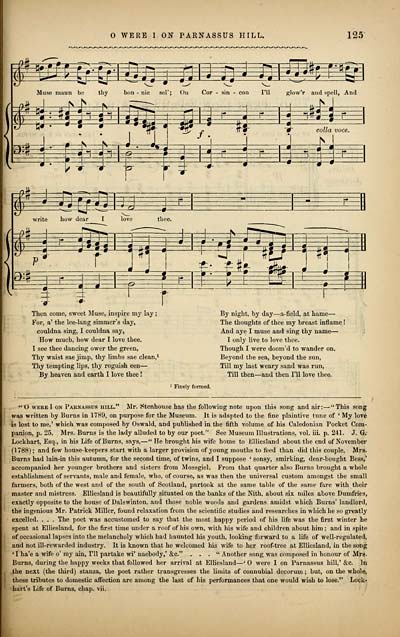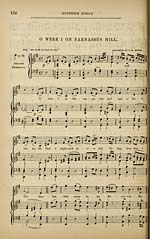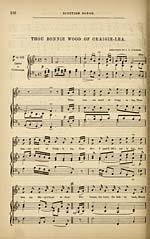Inglis Collection of printed music > Printed music > Songs of Scotland adapted to their appropriate melodies > Volume 3
(137) Page 125
Download files
Complete book:
Individual page:
Thumbnail gallery: Grid view | List view

WERE I ON PARNASSUS HILL.
125
piiiPf^pppiiii^B
Muse maun be thy bon - nie sel'; On Cor
sin - con I'll glow'r and spell, And
Then come, sweet Muse, inspire my lay ;
For, a' the lee-lang simmer's day,
couldna sing, I couldna say,
How much, how clear I love thee.
I see thee dancing ower the green,
Thy waist sae jimp, thy limbs sae clean, 1
Thy tempting lips, thy roguish een —
By heaven and earth I love thee !
By night, by day — a-field, at hame —
The thoughts of thee my breast inflame !
And aye I muse and sing thy name —
I only live to love thee.
Though I were doom'd to wander on.
Beyond the sea, beyond the sun,
Till my last weary sand was run,
Till then — and then I'll love thee.
Finely formed.
" (J were I on Parnassus hill." Mr. Stenhouse has the following note upon this song and air: — "This song
was written by Burns in 17X9, on purpose for the Museum. It is adapted to the fine plaintive tune of ' My love
is lost to me,' which was composed by Oswald, and published in the fifth volume of his Caledonian Pocket Com-
panion, p. 25. Mrs. Burns is the lady alluded to by our poet." See Museum Illustrations, vol. iii. p. 241. J. G.
Lockhart, Esq., in his Life of Burns, says, — " He brought his wife home to Elliesland about the end of November
(1788); and few house-keepers start with a larger provision of young mouths to feed than did this couple. Mrs.
Burns had lain-in this autumn, for the second time, of twins, and I suppose ' sonsy, smirking, dear-bought Bess,'
accompanied her younger brothers and sisters from Mossgiel. From that quarter also Burns brought a whole
establishment of servants, male and female, who, of course, as was then the universal custom amongst the small
farmers, both of the west and of the south of Scotland, partook at the same table of the same fare with their
master and mistress. Elliesland is beautifully situated on the banks of the Nith, about six miles above Dumfries,
exactly opposite to the house of Dalswinton. and those noble woods and gardens amidst which Burns' landlord,
the ingenious Mr. Patrick Miller, found relaxation from the scientific studies and researches in which he so greatly
excelled. . . . The poet was accustomed to say that the most happy period of his life was the first winter he
spent at Elliesland, for the first time under a roof of his own, with his wife and children about him; and in spite
of occasional lapses into the melancholy which had haunted his youth, looking forward to a life of well-regulated,
and not ill-rewarded industry. It is known that he welcomed his wife to her roof-tree at Elliesland, in the song
' I ha'e a wife o' my ain, I'll partake wi' naebody,' &c." ..." Another song was composed in honour of Mrs.
Burns, during the happy weeks that followed her arrival at Elliesland — ' were I on Parnassus hill,' &c. In
the next (the third) stanza, the poet rather transgresses the limits of connubial decorum ; but, on the whole,
these tributes to domestic affection are among the last of his performances that one would wish to lose." Lock-
hart's Life of Burns, chap. vii.
125
piiiPf^pppiiii^B
Muse maun be thy bon - nie sel'; On Cor
sin - con I'll glow'r and spell, And
Then come, sweet Muse, inspire my lay ;
For, a' the lee-lang simmer's day,
couldna sing, I couldna say,
How much, how clear I love thee.
I see thee dancing ower the green,
Thy waist sae jimp, thy limbs sae clean, 1
Thy tempting lips, thy roguish een —
By heaven and earth I love thee !
By night, by day — a-field, at hame —
The thoughts of thee my breast inflame !
And aye I muse and sing thy name —
I only live to love thee.
Though I were doom'd to wander on.
Beyond the sea, beyond the sun,
Till my last weary sand was run,
Till then — and then I'll love thee.
Finely formed.
" (J were I on Parnassus hill." Mr. Stenhouse has the following note upon this song and air: — "This song
was written by Burns in 17X9, on purpose for the Museum. It is adapted to the fine plaintive tune of ' My love
is lost to me,' which was composed by Oswald, and published in the fifth volume of his Caledonian Pocket Com-
panion, p. 25. Mrs. Burns is the lady alluded to by our poet." See Museum Illustrations, vol. iii. p. 241. J. G.
Lockhart, Esq., in his Life of Burns, says, — " He brought his wife home to Elliesland about the end of November
(1788); and few house-keepers start with a larger provision of young mouths to feed than did this couple. Mrs.
Burns had lain-in this autumn, for the second time, of twins, and I suppose ' sonsy, smirking, dear-bought Bess,'
accompanied her younger brothers and sisters from Mossgiel. From that quarter also Burns brought a whole
establishment of servants, male and female, who, of course, as was then the universal custom amongst the small
farmers, both of the west and of the south of Scotland, partook at the same table of the same fare with their
master and mistress. Elliesland is beautifully situated on the banks of the Nith, about six miles above Dumfries,
exactly opposite to the house of Dalswinton. and those noble woods and gardens amidst which Burns' landlord,
the ingenious Mr. Patrick Miller, found relaxation from the scientific studies and researches in which he so greatly
excelled. . . . The poet was accustomed to say that the most happy period of his life was the first winter he
spent at Elliesland, for the first time under a roof of his own, with his wife and children about him; and in spite
of occasional lapses into the melancholy which had haunted his youth, looking forward to a life of well-regulated,
and not ill-rewarded industry. It is known that he welcomed his wife to her roof-tree at Elliesland, in the song
' I ha'e a wife o' my ain, I'll partake wi' naebody,' &c." ..." Another song was composed in honour of Mrs.
Burns, during the happy weeks that followed her arrival at Elliesland — ' were I on Parnassus hill,' &c. In
the next (the third) stanza, the poet rather transgresses the limits of connubial decorum ; but, on the whole,
these tributes to domestic affection are among the last of his performances that one would wish to lose." Lock-
hart's Life of Burns, chap. vii.
Set display mode to: Large image | Transcription
Images and transcriptions on this page, including medium image downloads, may be used under the Creative Commons Attribution 4.0 International Licence unless otherwise stated. ![]()
| Special collections of printed music > Inglis Collection of printed music > Printed music > Songs of Scotland adapted to their appropriate melodies > Volume 3 > (137) Page 125 |
|---|
| Permanent URL | https://digital.nls.uk/94713232 |
|---|
| Shelfmark | Ing.129 |
|---|---|
| Additional NLS resources: | |
| Attribution and copyright: |
|
| Description | Scottish and English songs, military music and keyboard music of the 18th and 19th centuries. These items are from the collection of Alexander Wood Inglis of Glencorse (1854 to 1929). Also includes a few manuscripts, some treatises and other books on the subject. |
|---|
| Description | The Glen Collection and the Inglis Collection represent mainly 18th and 19th century Scottish music, including Scottish songs. The collections of Berlioz and Verdi collected by bibliographer Cecil Hopkinson contain contemporary and later editions of the works of the two composers Berlioz and Verdi. |
|---|

